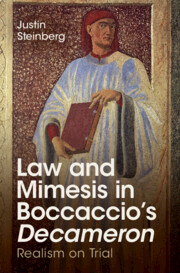Book contents
- Law and Mimesis in Boccaccio’s Decameron
- Law and Mimesis in Boccaccio’s Decameron
- Copyright page
- Contents
- Acknowledgments
- Introduction
- Chapter 1 The Novella on Trial
- Chapter 2 The Artist and the Police
- Chapter 3 The Widow and the Sovereign
- Chapter 4 Torture and the Sense of an Ending
- Chapter 5 Another Way of Possessing
- Chapter 6 The Author on Trial
- Bibliography
- Index
Chapter 1 - The Novella on Trial
Published online by Cambridge University Press: 07 August 2023
- Law and Mimesis in Boccaccio’s Decameron
- Law and Mimesis in Boccaccio’s Decameron
- Copyright page
- Contents
- Acknowledgments
- Introduction
- Chapter 1 The Novella on Trial
- Chapter 2 The Artist and the Police
- Chapter 3 The Widow and the Sovereign
- Chapter 4 Torture and the Sense of an Ending
- Chapter 5 Another Way of Possessing
- Chapter 6 The Author on Trial
- Bibliography
- Index
Summary
The first chapter analyzes the role of verisimilar realism in two trials: the summary trial officiated by Dioneo between the servants Tindaro and Licisca (Introduction, Day 6) and the inquest of the woolworker Simona, who is falsely accused of poisoning her lover Pasquino (4.7). It argues that Boccaccio uses these trials to foreground the risks involved when rhetorical categories such as “likely” and “probable” are used to evaluate evidence. These procedural tales are driven by the tension inherent between what everyone knows on the one hand and the singular event on the other, or between normative knowledge and the “novella.” In the trial between the two servants, the judge Dioneo acknowledges that women are not always virgins on their wedding night. He updates the storytellers’ shared picture of the world, making it more realistic. The trial of the woolworker Simona suggests how an art of the probable might incorporate singular phenomena. Yet certain details always remain outside the frame.
- Type
- Chapter
- Information
- Law and Mimesis in Boccaccio's DecameronRealism on Trial, pp. 31 - 59Publisher: Cambridge University PressPrint publication year: 2023

